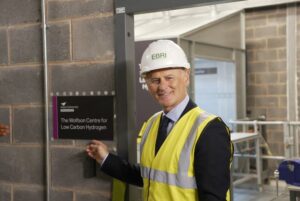Aston University opens UK’s first biomass-to-hydrogen research centre

The new centre cost around £1.5 million (€1.76 million) to build, including a £300,000 (€352,000) grant from the Wolfson Foundation.
Based within Aston’s internationally recognised Energy and Bioproducts Research Institute (EBRI), it provides a complete system that converts biomass feedstocks into hydrogen and power, designed to accelerate the UK’s transition towards a net-zero future.
The facility’s pilot plant integrates three main technologies: a high-pressure gasifier that converts biomass into a hydrogen-rich gas; a palladium membrane reactor that separates hydrogen of over 99.5 per cent purity; and a solid oxide fuel cell that converts the hydrogen into electricity at up to 85 per cent efficiency - far higher than the 25–35 per cent achievable through conventional engines.
Unlike most university-based pilot plants, the equipment at Aston can operate at industrial pressures, allowing researchers to replicate real-world conditions and rapidly test different feedstocks or catalysts.
The modular design also means each component can run independently or as part of the complete system.
According to Professor Zhentao Wu, co-director of EBRI, the integrated design enables the team to study the full process “from biomass to hydrogen and electricity” without losing efficiency through pressure changes between stages.
At the launch on 11 September 2025, Aston’s Vice-Chancellor Professor Aleks Subic described the Wolfson Centre as “a collaborative research hub, bringing together academics, industry partners, policymakers, and students to help shape the future of low-carbon energy.”
Paul Ramsbottom OBE, chief executive of the Wolfson Foundation, said the project would “deepen collaboration with industry and support the UK’s continuing journey towards achieving net zero.”
Plans for the Wolfson Centre were first announced in January 2023.
















